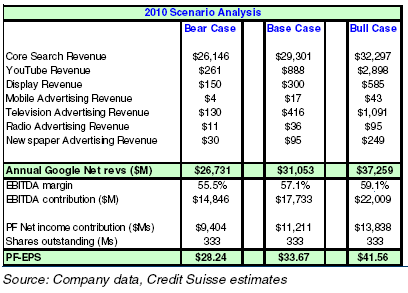Google: $900 price targets and the 'most basic element of Internet life'

The flowery prose about Google is flying. Wall Streeters can barely contain themselves with the accolades.First up, Credit Suisse analyst Heath Terry. He raised its price target on Google to $900. Why he stopped there I have no idea. Memo to Heath: $1,000 is a much rounder number and one that's quite possible. My advice: Go for it. Someone has to be first with the $1,000 price target for Google.
Terry says:
We are raising our forward estimates for Google in attempt to better account for long term opportunities in areas like display, local, and mobile. We believe that over time as all advertising goes digital, including television, radio, and outdoor, and Google becomes the de facto “operating system” for advertisers, providing them with the dashboard to monitor and optimizer their advertising, tremendous value will be created for Google shareholders.
He adds that Google will grow revenue at least 35 percent and earnings growth at least 30 percent. And if that all things to advertising theory doesn't work, Google is dominant in search, which is a "natural monopoly business."
We believe that search is a natural monopoly business and expect that over time Google will continue to gain share until they have effectively reached 100%. Over the last two years Google has gained 50bp of share/month in the US and 60bp globally. We expect these share gains to accelerate as declining scale makes it more difficult for competitors to justify the technology investments needed to maintain search result quality. These share gains, along with monetization improvements and the ongoing shift of ad dollars online should allow Google’s search business to grow 38% per annum over the next 5 years.
Toss in some potential in display advertising--assuming Google is allowed to buy DoubleClick--and what could possibly go wrong? Aside from a broader economic downturn, probably nothing. Terry's math adds up for Google despite my slight mocking (I'll save that for the Piper Jaffray note). Terry outlines a bunch of scenarios for Google in 2008 through 2011. Here's a look at Google's 2010 analysis (in millions).
What's notable here is the assumption that Google's television efforts will be a hit. Terry has a base case revenue for television advertising of $416 million. In 2008, television advertising is non-existent. Also notice the mobile advertising in 2010, up from nothing in 2008.
The funny thing is that Terry is no where near Stephen Arnold's $100 billion in Google revenue target. Something tells me Wall Street will come around at some point.
So what does all of this add up to. Piper Jaffray Gene Munster says in a research note that Google "is now the most basic element of Internet life." It's the "oxygen of life on the Internet."
Let's all breathe Google in. Exhale. Inhale. Exhale. Boy I feel better.
Munster's dispatch recapping Piper Jaffray's Global Internet Summit.
Google seems to have become the oxygen of Internet users' daily lives. Users we spoke with at GIS indicated they use Google without even realizing it. When we asked the teens and young adults on our panel which Web sites they cannot live without, Google did not come up among their answers which included MySpace, Facebook and BitTorrent. When asked why, all seven panelists responded, "It's a given I use Google" and "Google is not a Web site but something in my tool bar." While seven panel respondents is a comically small sample, all seven had the same message: Google has graduated beyond a Web site, and is so basic to life on the Web that users see using Google as a given and cannot function on the Internet without it.
I'd give you some more insight from Munster's note, but I really need some allergy meds. My allergies are terrible and it's almost winter. Must be all that flowery prose today.
